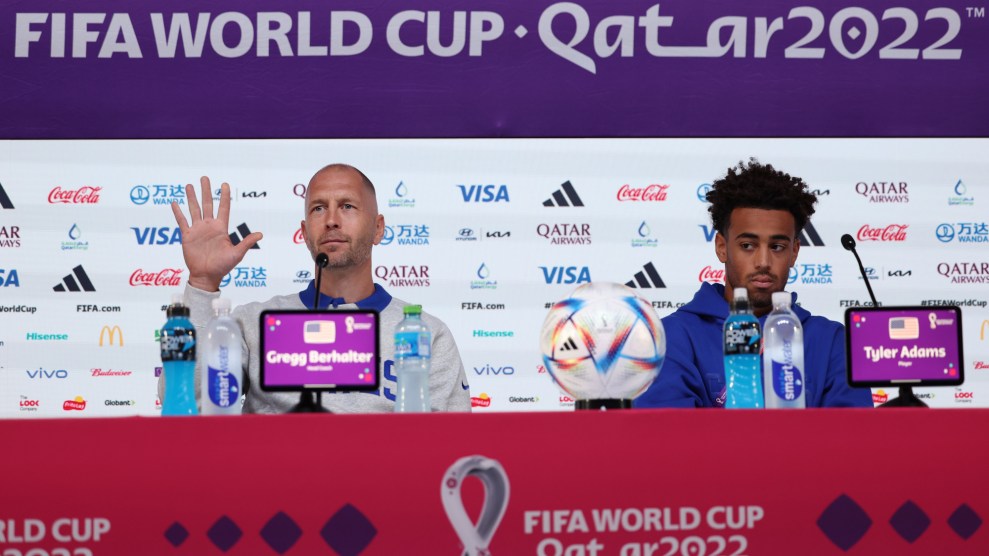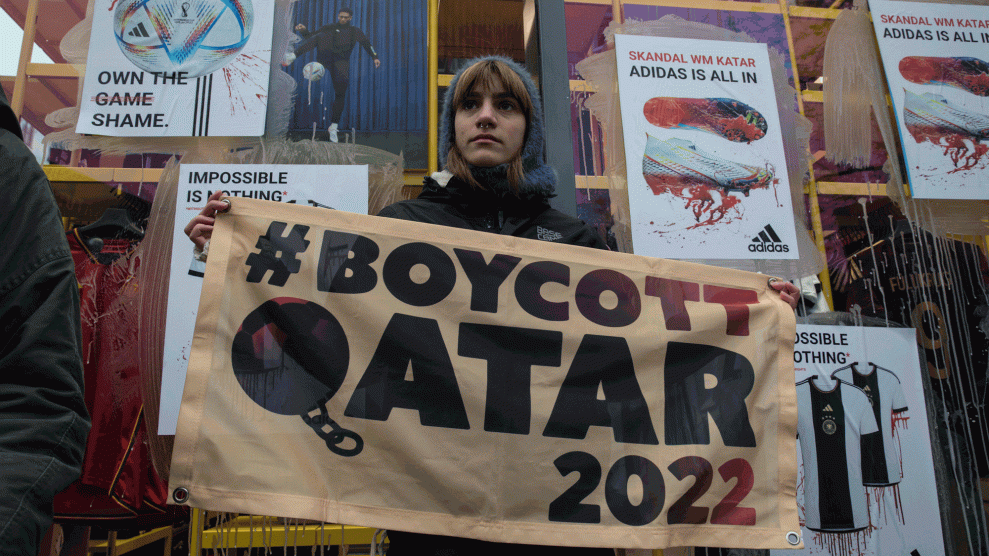
Gregg Berhalter and Tyler Adams.Jia Haocheng/Xinhua via ZUMA Press
The political subtext of the 2022 men’s World Cup in Qatar has never been particularly well hidden, because the politics is sort of the point. During every match of the tournament on Fox, ads paid for by the government of Qatar boast of the country’s relationships with American universities and the US armed forces—flexing its soft-power muscles on a network that has explicitly promised not to bring up the deaths of migrant workers in the country, or Qatar’s criminalization of homosexuality. Fans and journalists who have attempted to display rainbow imagery in protest have been confronted by security, despite the nation’s promises that such symbols would be welcomed at the tournament.
On the field, England’s captain had promised to wear a “One Love” armband in a show of support for LGBT people but backed down when the English Football Association was informed that doing so would result in a yellow card. (How much of a protest is it really, if you’re only willing to do it with official blessing?) German players posed for a pre-game photo with their hands over their mouths. Compared to even those subdued displays of dissent, the US men’s national team has been quiet in Qatar. Too quiet, depending on who you ask.
“I wonder what our men are thinking and feeling right now, because I haven’t really seen a lot of them speak out on this topic,” the US women’s national team defender Ali Krieger said last week on the podcast she hosts with her spouse and former USWNT teammate, Ashlyn Harris. Harris stated that the women’s team never even would have participated in such a tournament.
But on Sunday, US Soccer did take a political stand, in perhaps the most oblique way possible. In a Twitter post showing the standings from the US’ four-team World Cup group, it replaced the official flag of Iran—which the USMNT faces on Tuesday in a game it must win to advance to the next round—with a version that included neither the national emblem nor the Islamic messaging. (It would be hard to tell in a thumbnail, but the phrase “Allahu Akbar”—“God is great”—appears 22 times on the flag.) In the same post, US Soccer referred to the Islamic Republic of Iran as “Iran,” rather than “IR Iran,” as it’s usually referred to in such communications. A US Soccer spokesperson told reporters that the tweet was a “one-time graphic” to show “support for the women in Iran fighting for basic human rights.”
The death of Mahsa Amini, a 22-year-old woman who died in September after being arrested for allegedly wearing an “improper” hijab in public in Tehran, has set off months of protests in Iran against the government’s oppressive treatment of women. And those demonstrations have spilled over from Iran to Qatar. Iranian players refused to sing their national anthem before the team’s first game against England. In the ensuing days, CNN reported that Iranian players’ families have “been threatened with imprisonment and torture” if the team attempts a protest before the Tuesday match. And the government has shown a willingness to follow through on such threats; last week, Voria Ghafouri, a former captain of the Iranian national team, was arrested for criticizing the government. In Qatar, pro-regime Iranian fans have harassed fans who support the protests and stadium security guards have confiscated t-shirts with Mahsa Amini’s name on them. Among the items confiscated by security outside stadiums: the pre-revolutionary Iranian flag.
But like many attempts to make an important point on Twitter, US Soccer’s gesture wasn’t fully thought out. For one thing, simply coming out and saying you support “the women in Iran fighting for basic human rights” would probably have conveyed the same point in a clearer and less regime-changey way. For another, US Soccer had not actually informed the US men’s national team that it would be issuing this political statement. Iran filed a request to have the US removed from the tournament for violating FIFA’s rules against actions that offend “the dignity or integrity of a country,” and while that is not going to happen, US Soccer did delete the post and on Monday national-team manager Gregg Berhalter apologized for the gesture that had been made on his team’s behalf.
A make-or-break World Cup match between the US and Iran was never going to be entirely normal. But Berhalter’s regularly scheduled Monday press conference was as unusual as they come. Iranian journalists, it turned out, were not there to ask Berhalter why Gio Reyna has only played a handful of minutes in the team’s first two matches.
As the soccer journalist Grant Wahl recounted in his write-up of the press conference, Berhalter was asked if Americans even cared about the team, given “the high rise of inflation.” He was asked about the US government’s refusal to issue travel visas to Iranians visiting the United States, even though Americans with a passport “can visit anywhere in Iran.” (Perhaps overselling the country’s hospitality to Americans just a bit.) And he was asked why he hasn’t pressured Joe Biden to remove Navy vessels from the Persian Gulf.
It is tempting to imagine what that conversation between Joe Biden and Gregg Berhalter would be like. What kind of small-talk would there be, before Berhalter broached the subject of US ships in the Persian Gulf—or do you think he would just jump right into it?
But the most notable moment came when an Iranian journalist scolded Tyler Adams, the USMNT captain, for mispronouncing the name of the country (he pronounced it “eye-ran”) and asked him how he could feel comfortable representing a country with a long history of racism. Adams’ reply is sort of a remarkable answer for a 23-year-old thrown into one of the world’s most volatile geopolitical contexts.
Here is Tyler Adams with a brilliantly-handled response after being told he pronounced Iran wrong. He was also asked about discrimination against black people in America. This is why he’s #usmnt captain.👏 pic.twitter.com/NCCMjMoGef
— Ben Jacobs (@JacobsBen) November 28, 2022
For his part, when Iran’s Portuguese coach Carlos Quieroz—who did a bit of work for US Soccer back in the day—was asked about the flag, he expanded his answer to reference mass shootings in the US.
“We have solidarity with causes all over the world whoever they are,” he said. “If you talk human rights, racism, kids dying at schools from shooting—we have solidarity with all. But we bring a smile for 90 minutes, that is our mission.”
This is not the only flag controversy at the World Cup. FIFA is now investigating Serbia for displaying a flag in its locker room that featured a map of the country in which Kosovo—an independent nation where Serbia once conducted a campaign of ethnic cleansing against ethnic Albanians—was included inside the national borders. Serbia’s next opponent, in a similarly make-or-break match for both teams, is Switzerland, whose team is anchored by several players of Kosovar descent; when these teams last met in a competitive match, Switzerland’s Swiss-Kosovar stars performed double-eagle goal celebrations that mimicked the Albanian flag.
The story of this year’s World Cup has in large part been the story of an attempt to keep inconvenient politics out of an event that is political to its core, on everything from its sponsorships to its hosts to its construction to its participants. It’s not possible to stick to sports at the World Cup. The world always finds a way.
Correction, Nov. 29: An earlier version of this story misstated what Mahsa Amini was arrested for.

















